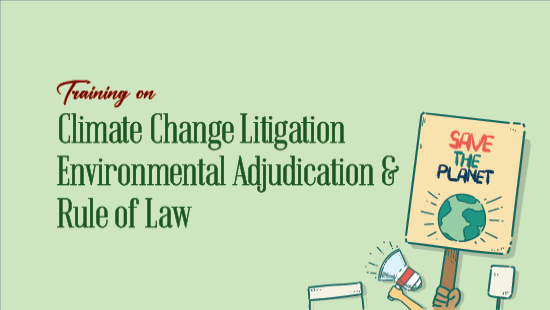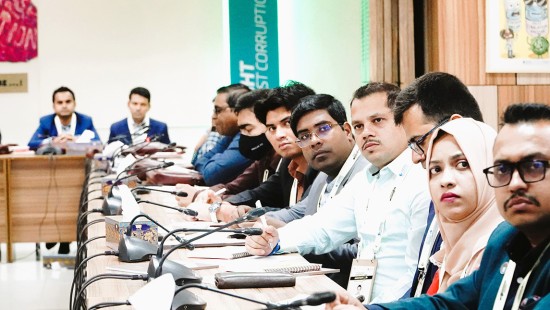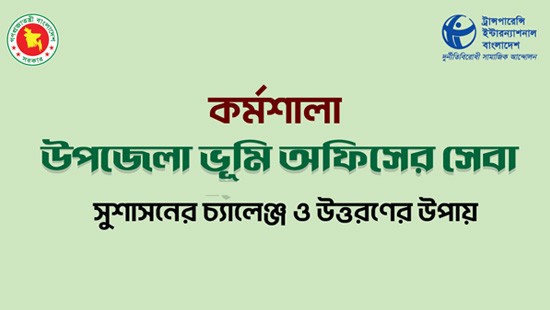Published: 04 December 2024
Over the past 15 years (2009–2024), households in Bangladesh have paid an estimated total of BDT 146,252 crore in bribes or unauthorized payments to access services from 18 different sectors and institutions, according to Transparency International Bangladesh’s (TIB) National Household Survey (NHS) 2023. TIB has unveiled the study at a press conference in its Dhaka office.
The survey also reveals that 70.9% of households reported encountering corruption while availing services from public and private institutions between May 2023 and April 2024. During 2023, an estimated total of BDT 10,902 crore was transacted in bribes across all included sectors and institutions. This figure constitutes 1.43% of the revised national budget for the 2023–24 fiscal year and 0.22% of GDP, underscoring the alarming scale of corruption in Bangladesh’s service sectors.
The Longstanding Corruption Survey by TIB
Since 1997, TIB has carried out the survey every two years. This is the tenth survey that has been made public so far. Between May 2023 and April 2024, the survey collected information on the harassment and corruption that households experienced when obtaining services from different sectors. The survey's data collection period ran from May 13, 2024, until August 3, 2024.
Most Corrupt Sectors Identified
 Passport services were identified as the most corrupt (86%), followed closely by BRTA (85.2%), law enforcement agencies (74.5%), judicial services (62.3%), land services (51%), public healthcare (49.1%), and local government institutions (44.2%). Overall, 50.8% of households reported paying bribes or being coerced into paying unauthorized money to access services. The highest incidences of bribery were recorded in passport services (74.8%), BRTA (71.9%), law enforcement agencies (58.3%), judicial services (34.1%), land services (32.3%), and local government institutions (29.7%).
Passport services were identified as the most corrupt (86%), followed closely by BRTA (85.2%), law enforcement agencies (74.5%), judicial services (62.3%), land services (51%), public healthcare (49.1%), and local government institutions (44.2%). Overall, 50.8% of households reported paying bribes or being coerced into paying unauthorized money to access services. The highest incidences of bribery were recorded in passport services (74.8%), BRTA (71.9%), law enforcement agencies (58.3%), judicial services (34.1%), land services (32.3%), and local government institutions (29.7%).
Corruption's Institutionalization
The main causes of corruption, according to the majority of respondents, are reward systems for corrupt people, a lack of social awareness, and impunity. Furthermore, 77.2% of bribery-paying households claimed they had no other option since "services cannot be obtained without paying bribes." These results point to an alarming institutionalization of corruption that requires immediate action.
At the press conference, Dr. Iftekharuzzaman, the Executive Director of the TIB said, "It is alarming that individuals who have been accused of corruption are being elevated to prominent positions. The persistence of this trend is indicative of the institutionalization of corruption through impunity, a situation that is of great concern to us. The public's most pressing demand, as evidenced by the survey results, is that those who engage in corruption be held accountable. The present situation presents an essential opportunity. By taking immediate action against corruption, the interim government may establish a solid precedent that serves as a benchmark for future governments, encouraging them to persist in their efforts to combat corruption".
Increased Corruption in In-Person Services
 According to the report, corruption is more common when services are received in person as opposed to online or through a combination of techniques. The poll highlights shortcomings in digital services and the forced use of mixed methods, which still require service receivers to pay bribes, allowing for corruption even if digital services have been introduced in a number of industries.
According to the report, corruption is more common when services are received in person as opposed to online or through a combination of techniques. The poll highlights shortcomings in digital services and the forced use of mixed methods, which still require service receivers to pay bribes, allowing for corruption even if digital services have been introduced in a number of industries.
Dr.Zaman further stated, "We have observed that the widely publicized declaration of "zero tolerance against corruption" remains confined to rhetoric." Survey that reveals the prevalence of corruption are frequently disregarded, despite the government's rhetoric regarding its efforts to combat it. The operational scope of institutions responsible for corruption prevention has been significantly reduced, and they are also ineffective. As a result, the general public is compelled to tolerate corruption as because they cannot control it."
The Poor's Burden
The survey also reveals that marginalized and low-income people bear a disproportionate amount of the burden of corruption. Households with lesser incomes are more affected by bribery and illegal payments. Furthermore, corruption adds to the burden already placed on women, religious minorities, indigenous people, and people with disabilities, making their socioeconomic difficulties worse and further marginalizing them. Corruption in local government agencies and the educational system disproportionately affects women, discouraging their involvement and impeding their advancement.
Recommendations:
The survey recommends taking legal action against individuals involved in corruption, with active roles for the Anti-Corruption Commission (ACC) and relevant institutions. Full digitization of services and the implementation of ‘one-stop’ service systems are urged to minimize direct interactions and reduce corruption. Institutions should adopt modern codes of conduct, specifying service delivery protocols, timelines, and behavior standards, alongside systems to collect recipient feedback for performance evaluation. Employee promotions and placements should be merit-based, with corruption-accused individuals barred from benefits. Additionally, gaps in personnel, infrastructure, and logistics must be addressed, with skill-enhancing training programs introduced for employees.
Find more detail: https://www.ti-bangladesh.org/nhs









